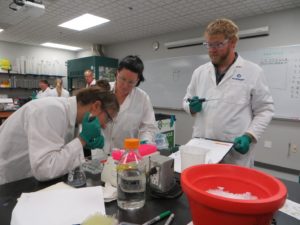 Significant resources are required to deliver high-quality science experiences for students and their teachers. In addition to generous amounts of staff time, for both preparation and program delivery, often there are costly lab supplies. Access to a well-equipped laboratory designed to facilitate educational experiences is also important.
Significant resources are required to deliver high-quality science experiences for students and their teachers. In addition to generous amounts of staff time, for both preparation and program delivery, often there are costly lab supplies. Access to a well-equipped laboratory designed to facilitate educational experiences is also important.
Of course, hands-on experiences are related to learning: for example, becoming scientifically literate, meeting science standards, preparing for AP tests. That said, many of us involved in science outreach activities will tell you that perhaps the most significant justification for these investments is that you never know when one of the students will experience that ‘Aha!’ moment which proves to be life-changing for them.
Over the years, we have heard many testimonials from students, teachers, school-to-career coordinators and other school district personnel, mentors and parents that speak to this experience. There just seems to be something about getting into the lab and engaging directly in “doing science” that stays with some participants as they head back to school, continue with their studies and on to their careers. Continue reading ““Aha! Moments” in Science Education”
 The start of a new year is always a good time for reflection. For those of us at the BioPharmaceutical Technology Center Institute (BTC Institute), this means looking at the programs we offer and considering ones we might like to develop.
The start of a new year is always a good time for reflection. For those of us at the BioPharmaceutical Technology Center Institute (BTC Institute), this means looking at the programs we offer and considering ones we might like to develop.